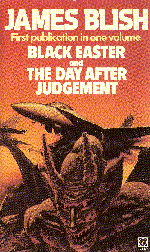Poul
Anderson mastered historical fiction, science fiction (sf) and fantasy
and even set one novel in each of these genres in the fourteenth century
with a minor connection between the historical novel, Rogue Sword, and the sf novel, The High Crusade. (See an earlier post on Poul Anderson Appreciation, "Finding an Unexpected Connection" by Sean M Brooks, Wednesday, 9 May, 2012. Also here.)
James
Blish, with a much smaller output, not only mastered these three genres
but also went one step further than Anderson or any other author by
writing a three genre Trilogy, After Such Knowledge:
in
Volume I, Doctor Mirabilis (a historical novel), Roger Bacon, the
founder of scientific method, is suspected of witchcraft and has a
drug-induced vision of Armageddon;
in Volume II, (a) Black Easter and (b) The Day After Judgement (contemporary fantasies), magicians release and cannot recall demons who then wage and win Armageddon;
in Volume III, A Case Of Conscience
(futuristic sf), experiences on an extra-solar planet oblige a Jesuit
biologist to ask heretical questions about the relative powers of God
and Satan and to fear an imminent Armageddon.
The
Trilogy is thematic, not linear, so it does not matter that Armageddon
happens in the late twentieth century yet is still to happen in the
mid-twenty first century - although this discrepancy might be resolved
by the conclusion of The Day After Judgement, when Satan/God
undoes (at least some of) the damage caused by the conflict in order to
initiate a long development of mankind towards Godhood. This development
could still be occurring in Volume III although, as was the case after
the Armageddon in Volume II, the characters' mind-sets have not
progressed yet.
The unifying theme of the Trilogy is
the question whether the desire for secular knowledge is evil. Blish,
like Anderson or any other scientifically trained hard sf writer,
answered "No" but he managed to write a Trilogy about the question.
Anderson
addressed a single theme in different genres when he presented the
original of Odin in a historical novel, a time traveler mistaken for
Odin in an sf story and Odin in three fantasy novels. However, this single
theme does not make these works a single series. Instead, the contrasting
treatments differentiate them as distinct works.
I was reminded of Black Easter, the definitive novel of demonic conjuration, when I read Anderson's account of Queen Skuld's ritual cursing in Hrolf Kraki's Saga. Pagan witchcraft was followed by Christian witchcraft which led, in Blish's fantasy, to Armageddon.

No comments:
Post a Comment